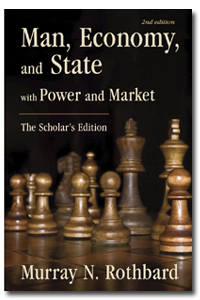
Money, Monopoly, and Market Intervention
Economics Econ3 — with Robert P. Murphy
Cost: $145 Length: 8 Weeks
Dates: October 5, 2011 - November 23, 2011
Status: In Session
This course will cover chapters 10, 11, and 12 of Murray Rothbard's systematic treatise on economics, Man, Economy, and State. In this course, you will have the ideal instructor: Robert Murphy, the author of the study guide to Man, Economy, and State. Chapter 10 contains one of Rothbard's foremost original contributions to economic science: his discussion of monopoly and competition. Rothbard went beyond even Mises in exculpating the pure market economy from the arguments of antitrust-advocating market critics. Rothbard argued that on the free market there can be no such thing as a monopoly price which is different in any significant way from a competitive price. In chapter 11, Rothbard presents a thorough and completely Misesian exposition of monetary theory. Among other highlights, this chapter includes the most devastating and succinct critique of Keynesianism ever penned, as well as a thorough refutation of Irving Fisher's "equation of exchange" doctrine, thereby discrediting much of monetarism, and undercutting (before the fact) many of the arguments of the modern, quasi-Austrian, "Free Banking" school. And chapter 12 is a methodical deconstruction of the folly of all state intervention into the market economy. After having spent 11 chapters describing the essence and functioning of the market system, chapter 12 elucidates what happens when government throws a wrench in the gears. This course is a perfect follow-up to Murphy's previous courses based on Man, Economy, and State. However, having taken those courses is NOT required, and this course stands alone as an excellent study of 3 crucial areas in Austrian theory. This course is well-suited for anyone conversant with the Austrian understanding of the market process.

Economic Freedom Around the World
Economic History EH690 — with Robert Lawson
Cost: $95 Length: 5 Weeks
Dates: October 18, 2011 - November 21, 2011
Status: In Session
This course will consist of five lectures about the concept, measurement and consequences of economic freedom. The Economic Freedom of the World index, published by the Fraser Institute and co-authored by James Gwartney, Robert Lawson, and Joshua Hall, will be the focus of the course. Topics will include (1) the Concept and Measurement of Economic Freedom, (2) Economic Freedom and Growth, (3) Economic Freedom and Human Right Violations, (4) The Hayek-Friedman Hypothesis on Economic Freedom and Political Freedom, (5) The Freedom to Travel.

Capitalism and the Advance of Women: A History
Economic History EH560 — with Wendy McElroy
Cost: $120 Length: 6 Weeks
Dates: October 27, 2011 - December 14, 2011
Status: In Session
No force in society empowers a woman more than the right to own property, including in her own person, and to trade freely for profit. This course celebrates the indispensable role of capitalism in the liberation of women. It presents the lively voices of women who have embraced the benevolence and power of laissez-faire capitalism in their writings for over three centuries. The course sets a context for these voices through a historical overview of key periods, such as the Industrial Revolution, when women advanced in bounds toward equality. The last two lectures focus on contemporary issues -- e.g. affirmative action, minimum wage -- that attack the very basis of what women require for their well-being. Not egalitarianism but economic equality. Not political control but freedom.

Libertarian Ethics
Political Philosophy PP25 — with David Gordon
Cost: $95 Length: 6 Weeks
Dates: October 27, 2011 - December 8, 2011
Status: In Session
Why should liberty be advanced? What is the basis of rights? What is the best way to make the case for freedom? Should policy be judged according to consequences or morality? Questions such as these have divided libertarians. Mises was a firm utilitarian. Rothbard adopted a "natural rights" position. Hans Hermann Hoppe developed an "argumentation ethics" doctrine. This course will cover the ethics of each of the above thinkers. David Gordon will cover Rothbard and Hoppe. And co-instructor Daniel Sanchez will present and defend Mises' ethics.

The Real Causes of America’s Wars: A Revisionist View
History H645 — with David Gordon
Cost: $95 Length: 6 Weeks
Dates: November 8, 2011 - December 13, 2011
Status: Open for enrollment
“War is the health of the state”. These famous words of Randolph Bourne have been confirmed throughout the course of American history. This course will examine the origins of a number of America’s wars. In each case, we will study the real origins of the war and compare this with the officially circulated mythology. All too often, America’s wars are presented as conflicts between the “good guys”, us and the “bad guys”, our enemies. Propaganda to view the wars in this way plays a key role in advancing the power of the state, and it is essential for libertarians to understand the issues involved.



